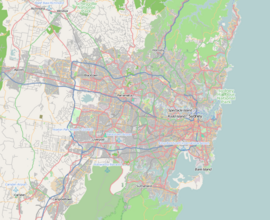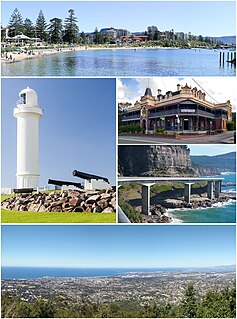
Wollongong, informally referred to as "The Gong", is a city located in the Illawarra region of New South Wales, Australia. The name is thought to be derived from the word woolyungah in the language of the Aboriginal inhabitants at the time of settlement, meaning five islands. Wollongong lies on the narrow coastal strip between the Illawarra Escarpment and the Pacific Ocean, 85 kilometres south of central Sydney. Wollongong had an estimated urban population of 302,739 at June 2018, making it the third-largest city in New South Wales after Sydney and Newcastle and the tenth-largest city in Australia by population. The city's current Lord Mayor is Gordon Bradbery AM who was elected in 2021.

Marrickville is a suburb in the Inner West of Sydney, in the state of New South Wales, Australia. Marrickville is located 7 kilometres south-west of the Sydney central business district and is the largest suburb in the Inner West Council local government area.
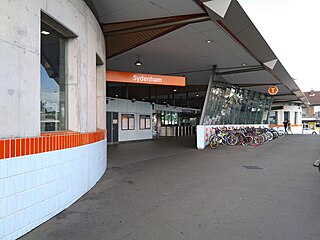
Sydenham railway station is a heritage-listed railway station located on the Illawarra line, serving the Sydney suburb of Sydenham in New South Wales, Australia. It is served by Sydney Trains T3 Bankstown, T4 Illawarra and T8 South services. It was designed by the New South Wales Government Railways and built from 1884 to 1962, with William Robinson having built the original 1884 buildings. It was added to the New South Wales State Heritage Register on 2 April 1999.

Tempe is a suburb in the Inner West of Sydney, in the state of New South Wales, Australia. Tempe is located 9 kilometres south of the Sydney central business district in the local government area of Inner West Council.
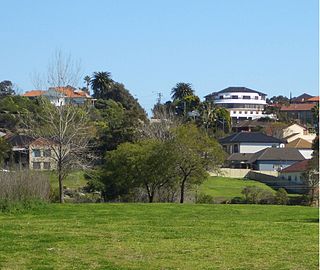
Undercliffe is an eastern section of the suburb of Earlwood located in South Western Sydney, New South Wales, Australia. Undercliffe is situated 10 kilometres south-west of the Sydney central business district within the local government area of the City of Canterbury-Bankstown.

Erskineville is an inner-city suburb of Sydney, in the state of New South Wales, Australia. It is located 6 kilometres south west of the Sydney central business district and is part of the local government area of the City of Sydney. Erskineville is a diverse suburb homing to a wide variety of ethnicity from its varying Southeast Europe and Aboriginal community. Erskineville is colloquially known as Erko.
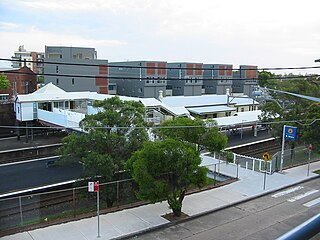
St Peters railway station is a heritage-listed railway station located on the Illawarra line, serving the Sydney suburb of St Peters in New South Wales, Australia. It is served by Sydney Trains T3 Bankstown line services. It was added to the New South Wales State Heritage Register on 2 April 1999.

Belmore railway station is a heritage-listed railway station located on the Bankstown line at Burwood Road, Belmore in the City of Canterbury-Bankstown local government area of New South Wales, Australia. It is served by Sydney Trains T3 Bankstown line services. It was designed and built by NSW Government Railways from 1895 to 1937. It is also known as Belmore Railway Station Group and Burwood Road. The property was added to the New South Wales State Heritage Register on 2 April 1999.
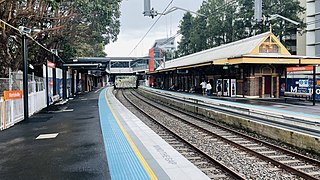
Marrickville railway station is located on the Bankstown railway line, serving the Sydney suburb of Marrickville. It is served by Sydney Trains T3 Bankstown line services. It was added to the New South Wales State Heritage Register on 2 April 1999.

Sydenham is a suburb in the Inner West of Sydney, in the state of New South Wales, Australia. Sydenham is located 8 kilometres south of Sydney central business district and is part of the local government area of Inner West Council. Sydenham is surrounded by the suburbs of Marrickville, St Peters and Tempe.

Wollongong railway station is a heritage-listed railway station on the South Coast railway line in New South Wales, Australia. It serves the central business district of Wollongong. It was added to the New South Wales State Heritage Register on 2 April 1999.

Austinmer railway station is a heritage-listed railway station located on the South Coast railway line in New South Wales, Australia. It serves the northern Wollongong suburb of Austinmer. It was added to the New South Wales State Heritage Register on 2 April 1999.

Centenary Square, formerly known as Bicentennial Square, is a civic square located in the heart of Parramatta, New South Wales, Australia. It faces the 1883 Parramatta Town Hall and St John's Cathedral. The square was listed on the Parramatta City Council local government heritage list on 20 August 1999.

Hong Kong House, also known since 1995 as the Hong Kong Economic and Trade Office, Sydney, is a landmark heritage building and former hotel in the Sydney central business district, City of Sydney, New South Wales, Australia. Built in 1891 to a design by Ambrose Thornley, it is located on 80 Druitt Street, at the corner with York Street, and is adjacent to other prominent heritage landmarks, the Sydney Town Hall and the Queen Victoria Building. Formerly known as Gresham Hotel, the property was added to the New South Wales State Heritage Register on 2 April 1999.

Marrickville High School is a co-educational, public secondary school, located in Marrickville, an inner western suburb of Sydney, New South Wales, Australia. The school is administered by the New South Wales Department of Education.
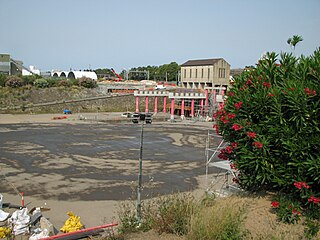
Sydenham Pit & Drainage Pumping Station 1 is a heritage-listed pumping station and stormwater drain in Garden Street, Marrickville, Inner West Council, Sydney, New South Wales, Australia. The facility is located adjacent to the railway line running between Sydenham railway station and St Peters railway station. It was designed by the NSW Public Works Department, which built the project from 1935 to 1941. It is also known as Sydenham Stormwater Basin and Drainage Pumping Station (DPS1). The property is owned by Sydney Water. It was added to the New South Wales State Heritage Register on 15 November 2002.
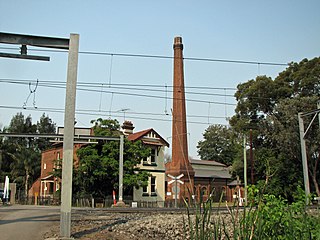
Sewage Pumping Station 271 is a heritage-listed sewage pumping station located adjacent to 5 Carrington Road, Marrickville, Inner West Council, Sydney, New South Wales, Australia. It was designed and built by the New South Wales Public Works Department. It is also known as SPS 271. The property is owned by Sydney Water. It was added to the New South Wales State Heritage Register on 18 November 1999.

Marrickville Post Office is a heritage-listed post office at 274A Marrickville Road, Marrickville, Sydney, New South Wales, Australia. It was added to the Australian Commonwealth Heritage List on 22 August 2012.
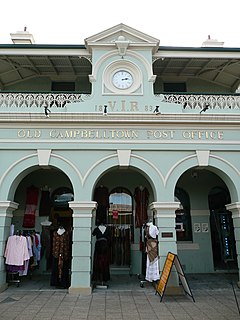
The Campbelltown Post Office is a heritage-listed former post office and now shops and office space at 261 Queen Street, Campbelltown, City of Campbelltown, New South Wales, Australia. It was designed by James Barnet and built in 1881. It is also known as Campbelltown Post Office (former). The property is privately owned. It was added to the New South Wales State Heritage Register on 2 April 1999.

